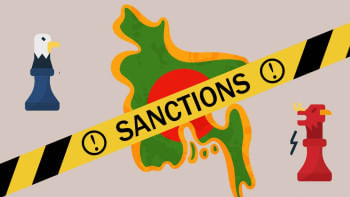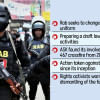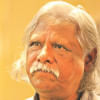Is the US resetting relations by applying anti-kleptocracy law?

The recent designation of Bangladesh's former army chief, Gen (retd) Aziz Ahmed, by the United States under its anti-kleptocracy and human rights law has raised significant questions, particularly: why now? This designation, under Section 7031(C), disqualifies him and his immediate family members from obtaining entry visas to the US.
In an interview with this daily, Aziz himself questioned the timing, noting that he could have been banned in 2021 when Al-Jazeera aired the investigative documentary All the Prime Minister's Men, which alleged gross misuse of power and significant corruption by him. He recalled that despite the controversy, his official visit to Washington proceeded as planned, even though nine NGOs had called for its cancellation. This decision drew strong criticism from activists.
The timing of this sanction of Aziz Ahmed is particularly puzzling as it follows a visit by US Assistant Secretary of State for South and Central Asian Affairs Donald Lu, aimed at "rebuilding trust" between the two countries. Lu acknowledged recent tensions over the US push for free, fair, and nonviolent elections in Bangladesh but emphasised a desire to look forward, and reset the relations.
His remarks were seen as a success for the Awami League government's diplomacy, with Foreign Minister Hasan Mahmud mocking the opposition, suggesting that Donald Lu's visit had exacerbated their frustrations. Lu has garnered attention due to his perceived role in political developments in Pakistan, where supporters of imprisoned former Prime Minister Imran Khan accuse him of orchestrating the downfall of the PTI government.
The current reactions from the Bangladesh government and ruling party are notably less intense compared to the outrage following the US ban on the Rapid Action Battalion (Rab) and seven of its officials in 2021. This might be because Gen Aziz Ahmed no longer holds office and the political climate is less hostile. The foreign minister's reluctance to engage with reporters on the subject, dismissing it as "an army matter," stands out, as does the fact that the army headquarters issued two denials when Al-Jazeera aired its allegations.
Previously, the US sanctioned two law enforcement forces in Bangladesh—Rab and SWAT—and seven top Rab incumbent and former officials, but this time it has targeted someone who was at the top tier of the state hierarchy. Since Aziz is retired, the US move might seem to have no practical effect. However, the allegations date back to his tenure as the military chief making it difficult to argue that the culpability is limited to the individual, instead of the institution. Aziz himself highlighted the broader implications, noting that his important position during the Awami League government means the ban also indirectly humiliates the government.
The US action reflects its assessment of three issues in Bangladesh: dysfunctional democratic institutions; prevalent corruption and abuse of power; and ineffective mechanisms for criminal accountability and the rule of law. This situation is seen as resulting from enabling conditions within the power structure.
The visa ban against Gen Aziz Ahmed and his family differs from the visa policy announced by the US last year ahead of the January 7 parliamentary election, which did not disclose the identities of those affected. The application of Section 7031(C) allows for the identification of the subject, which in this case is Aziz. This provision of the Foreign Relations and Related Programs Appropriations Act targets foreign officials and their immediate family members involved in significant corruption or gross human rights violations.
The US Department of State said Aziz's actions undermined Bangladesh's democratic institutions and public faith in these institutions. Specifically, it accused him of significant corruption by interfering in public processes and helping his brother evade accountability for criminal activities. Additionally, he allegedly facilitated improper awarding of military contracts and accepted bribes for government appointments. Notably, three of his brothers were convicted in multiple murder cases, with one absconding abroad, and he is accused of having a role in their acquittal.
The timing of the ban remains a question that only US officials can answer. It might suggest dissatisfaction with the outcomes of Donald Lu's visit or a response to Bangladesh's failure to investigate the allegations against Gen Aziz. After the airing of the Al-Jazeera report, there were talks of a case against the TV channel, and Aziz mentioned holding a press conference to clear his name, neither of which happened. Instead, Al-Jazeera received several international awards for excellence in journalism for the investigative report.
The US action reflects its assessment of three issues in Bangladesh: dysfunctional democratic institutions; prevalent corruption and abuse of power; and ineffective mechanisms for criminal accountability and the rule of law. This situation is seen as resulting from enabling conditions within the power structure.
Undoubtedly, geopolitics is at play in the relations between the two countries, and the US wants to include Bangladesh in its Indo-Pacific Strategy, which many analysts believe prevented them from penalising the AL regime for its failure in ensuring a free and fair election. Countering China's possible dominance remains their priority. Hence, this apparently contradictory and delayed action against the former army chief is quite intriguing.
While the ruling party has managed to limit the political impact of the bans against Rab and SWAT, such sanctions are difficult to lift once imposed. This is evident from the long-standing suspension of the Generalised System of Preferences (GSP) and the ongoing Leahy Act ban against SWAT. The concern is whether the list of sanctions will grow, and how long their economic and political costs can be sustained.
Kamal Ahmed is an independent journalist. His X handle is @ahmedka1
Views expressed in this article are the author's own.
Follow The Daily Star Opinion on Facebook for the latest opinions, commentaries and analyses by experts and professionals. To contribute your article or letter to The Daily Star Opinion, see our guidelines for submission.

 For all latest news, follow The Daily Star's Google News channel.
For all latest news, follow The Daily Star's Google News channel. 









Comments